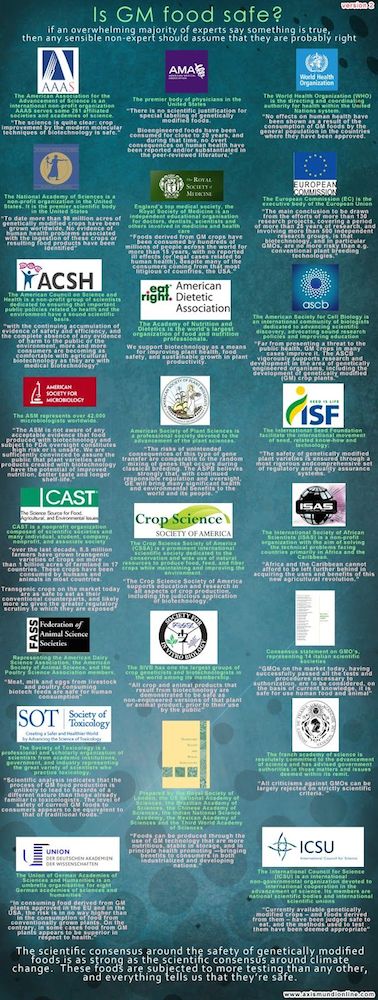Question
How do you know GMOs will not get people sick If you do not have any long term research on the impact of GMOs on human beings to support that?
Submitted by: Diego
Answer
Expert response from Laura Privalle, Ph.D.
Global Head Regulatory Field Study Coordination, BASF
Monday, 29/02/2016 17:46
Prior to commercialization every GMO product is subjected to an extensive safety assessment which is reviewed by regulatory bodies all around the world. These products are the most studied foods ever consumed. The safety of the genes inserted, the proteins produced, the crop and any consumed fraction must be shown to be safe for humans, animals and the environment.
There is a wonderful paper published in the Journal of Animal Science in 2015 that estimates that 102,732,168,000 chickens, turkeys, beef cattle, dairy cows, and hogs were produced between 2000 and 2011. GMOs, first introduced in 1996, were so rapidly adopted that greater than 90% of the corn, soy, canola and cotton crops are GMO. As a result, these animals have been fed GMOs across many generations with no harm. Humans have also been consuming these products since that time with no negative impact.
Please read a previous response to a question regarding the effects of GMOs on human health here.
Answer
Expert response from Community Manager
Moderator for GMOAnswers.com
Wednesday, 20/01/2016 21:06
You might be surprised to learn that long-term research studies have been conducted on GM crops. These tests are performed by both industry experts and independent organizations to make sure that GM crops are safe for humans and the environment. Major scientific and regulatory bodies around the world have stated that the GM crops currently available for sale are safe.
Denneal Jamison-McClung, biotechnology program associate director at the University of California, Davis, discusses the long term research related to GM foods, and their safe track record here. She explains that the “safe use of GM foods since 1996, coupled with our knowledge of human and plant physiology, points to long-term safe use of genetic engineering as a plant breeding tool set in agriculture.”
Looking for more on the health and safety of GMOs? Click here to explore more.
The following infographic includes excerpts from more than 600+ safety assessment studies which assess the health and safety of GMOs.

You can learn more by reading Bruce Chassy’s response to a similar question and by reading Layla Katiraee’s article on “Why there are no long term GMO studies on humans” here. We hope the information provided answers your question. If you have any further questions, please ask. Also, feel free to contribute to the discussion in the comment section below!
Answer
Expert response from Community Manager
Moderator for GMOAnswers.com
Wednesday, 20/01/2016 21:06
You might be surprised to learn that long-term research studies have been conducted on GM crops. These tests are performed by both industry experts and independent organizations to make sure that GM crops are safe for humans and the environment. Major scientific and regulatory bodies around the world have stated that the GM crops currently available for sale are safe.
Denneal Jamison-McClung, biotechnology program associate director at the University of California, Davis, discusses the long term research related to GM foods, and their safe track record here. She explains that the “safe use of GM foods since 1996, coupled with our knowledge of human and plant physiology, points to long-term safe use of genetic engineering as a plant breeding tool set in agriculture.”
Looking for more on the health and safety of GMOs? Click here to explore more.
The following infographic includes excerpts from more than 600+ safety assessment studies which assess the health and safety of GMOs.

You can learn more by reading Bruce Chassy’s response to a similar question and by reading Layla Katiraee’s article on “Why there are no long term GMO studies on humans” here. We hope the information provided answers your question. If you have any further questions, please ask. Also, feel free to contribute to the discussion in the comment section below!
GMO Innovation Contest Recap!
